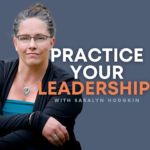62. Ditch Imposter Syndrome & Claim Your Confidence
Have you been overidentifying with imposter syndrome?
It’s time to stop.
When you use the label of imposter syndrome for yourself, you carry that label with you in everything you do. You create stories about yourself and your capabilities that aren’t helpful or even true.
On the flipside, when you decide to claim your confidence and explore which people, environments and practices help you feel most confident, you’re able to recognize the real patterns behind your insecurities and work on them.
Stop over identifying with imposter syndrome. Claim your confidence.

Listen on
Resources
- Read ‘Hidden Potential’ by Adam Grant
- Watch Adam Grant and Oprah discuss why Imposter Syndrome “is you underestimating yourself”
- Use Abby Van Muijen’s Emotion Wheel
- For more conversations on this topic, listen to our past podcasts on Confidence and Overcoming Imposter Syndrome

Transcript
Transcript is AI auto generated. Please excuse any typos.
Hi everyone. I’m Saralyn Hodgkin, and this is the podcast to practice your leadership.
Claiming your confidence is a practice. And you deserve to claim that confidence. I hear so much about imposter syndrome, for example, or other labels that we over identify with. And yes, I do think there are many of us who are over identifying with imposter syndrome. I am working on reducing my over identification or identifying at all, actually, with imposter syndrome.
It’s actually really pissing me off. The amount of labeling that we’re doing to ourselves around, I’m an imposter. Well let’s, can we hold on a sec and let’s just take a pause with the labels we attach to ourselves. Because the labels that we attach to ourselves, we carry them, we carry those labels, and we start to create or further confirm stories we tell ourselves, stories that society or others in our life start telling ourselves.
And it’s like, hold on, what is the effect of labeling myself, uh, with imposter syndrome? Versus claiming my confidence because I am confident. Like there are places in the world that I show up where I am confident and it might be at the grocery store. It might be in front of that team member. It might be with my 15 year old kid.
It might be with my dog. It might be in my yoga practice, wherever. There are places in our world where we are confident. And so the invitation, folks, is to claim that confidence, reduce the labeling on things like imposter syndrome, and instead saying, okay, no, no, no, hold on in this situation, what are the emotions that are coming up for me?
And it might be, fragility, insecurity, sensitivity, that fragility, that fragileness creates this anxiousness or, uh, like wobbliness, lack of grounded, but can we use tools like the emotion wheel? I use Abby Van Muijen’s a lot. Can we use tools like that to be able to identify the emotions that we’re having versus taking these labels like imposter syndrome and saying, Oh yeah, I have imposter syndrome.
I’m working on it. Well, actually, can you claim that confidence and say, I’m a confident person and what I’m working on is in this context, when I show up in front of a board, when I show up in front of my manager. When I show up in front of my, the place that I pray, whatever it is, I get really wobbly and I get these emotions like fragility or insecurity.
And I’m, I’m working on that. I’m trying to recognize the pattern of what’s going on here. And I’m trying to understand the work I need to do on myself while also understanding that there’s a whole system possibly designed unconsciously or not. That that’s, that’s crafting this emotion that’s coming up.
And okay, so I’m just gonna, I’m going to look at the system and the stories in that system. I’m going to look at myself and I’m going to do some work around this versus labeling ourselves with things like imposter syndrome, which suddenly it’s like, well, I have no confidence. Well, that’s not a true story.
That’s not a fact. What saboteur is playing in there? Come on, let’s claim that confidence and say, Oh no, here’s something I’m working on. In this context, this is where I have these kinds of emotions. No problem. Claiming that confidence allows us to be able to look at patterns of where we show up in ways where we’re like, Ooh, I feel really insecure here.
And then be able to figure out, well, maybe it’s because I’m not celebrated here. Maybe it’s because I show up in this space and the people surrounding me don’t lift me up. Or they don’t support me in the way that I need support, or I’m just questioning whether I’ll be good enough. Well, where’s that questioning coming from?
Is that a saboteur playing out? Did I get some feedback? Was that feedback constructive feedback or was that someone dumping their stuff on me? Thanks. No, thanks. It’s being able to dig in to what’s actually going on versus labeling ourselves. Because when we start labeling ourselves, what I’m noticing is that it can be very unhelpful and it can be labels that sticks with us for years and transfer into different contexts.
And suddenly I’m not a very confident person. Okay, let’s pause on that. What would it mean for you to claim your confidence and to do that? Can you take a look around and say, wow, where do I source my confidence from? When I am confident, what’s going on in my world? Where am I sourcing it from? What are the stories that are being told to me by people who influence me?
Right? From influencers on social media or from like an actual IRL real life person in your life, like your colleague, right? Or, the person you work out with or your dog walking group. I don’t know, whatever it is, right? Like, it’s like, okay, where do I source my confidence? What helps me feel confident?
What’s going on in that situation? And so for me, some of it is, what helps me claim my confidence? What helps me claim my confidence? Yeah, what helps me, what helps me as Saralyn claim my confidence is first and foremost, my life partner, who I’ve been with 25 years. And I know that he is here, like he is literally here in a safe home with a family that loves me.
So if I go screw up in the world, it’s okay, I can come home. I’m love and accepted here unconditionally. Okay. Okay. Then it allows me to take more risk, it allows me to feel confident when I’m feeling really wobbly at the same time. Okay, I feel really, whew, grateful for that. And then what else builds my confidence?
My routine, my resiliency routine. Sleep, water, food. Basics that I totally sometimes take for granted and don’t take for granted. Um, and… Somehow moving my body, somehow to hydrating my body as it needs it. Um, hugging and petting my dog and, uh, getting outside. Like I have some pieces of routine that help me not think about, do I need to do that?
I just do it. And, uh, now I do it without thinking, but it’s been years of building certain habits so that I have some foundational elements. That when everything else is crumbling and my confidence is crumbling in this moment, I at least have some of that resilience platform for me to be, uh, resourced.
And then where else do I source? I source my confidence from practices of being grounded because when I am grounded, I can get perspective. And perspective allows me to, almost like in an observer role, see what’s going on in this. I’m not, I’m not an imposter here. I’m struggling with this element and this person says that they’re helping but they’re not helping in a way that’s actually helping me and I’m seeing narratives come in that actually I don’t identify with.
Okay, so there’s a situation going on here and some of my own work. Okay, let me get some perspective or sometimes it’s going out and talking with a colleague or a friend of listen this just happened, need some perspective here I need some help because I’m not getting the perspective I need and I’m swirling and I’m just berating myself and so on, right?
So sometimes not only just getting grounded, but getting some of that perspective. And then for me as well, there’s a balance between, especially when I show up to professional things, there’s a balance between being prepared and being alive in the moment. And I source my confidence from a combination of those two things together.
And everybody will have their own balance of that, but there’s something in that formula. That’s my formula that works for me. And showing up in places where I’m celebrated versus tolerated, and you can feel it. I can sense it and I’m not as confident in places where people are coming down on me.
Critical feedback is different, right? But in places where I just don’t feel like my voice is heard or that my voice matters in that place and so on. Right. And which then leads us to the second question of, okay, so what erodes your confidence? Because it’s to claim your confidence means knowing how and where I source my confidence from.
But it also means, okay, I can look out for these signals of what erodes my confidence. So one thing is when I start swirling, and I’m just like swirling in my energy in, in the words that are coming out of my, it’s like. Get grounded, Saralyn. Can’t get grounded? Well then be quiet and go, go, go lay down on the floor or something, right?
Like just catching myself swirling. That’s one place. Finding myself entangled in some kind of drama kind of conversations versus conversations that move to dealing with hard things, but in an empowerment place. Some of what erodes my confidence is certain societal messages of who I’m supposed to be and how I’m supposed to look and what I’m supposed to say.
I start questioning myself and then I start thinking, well, yeah, maybe I’m an imposter and what do I know about this? And pause, claim your confidence. What am I actually struggling with? What am I actually wondering about? Do I need to go get some more knowledge? Is that what’s going on? Or are there some societal messages or narratives coming from somebody else that I’m giving power to and it’s just not helping me or can I learn from those?
What does that look like? Right? Having conscious spaces of getting that perspective and then personally, I think, you know, gaining weight makes me feel less confident and this goes back to, you know, since I was like 12, right? There’s like therapy stuff in here and the whole nine yards and there’s a whole like there are there are personal patterns that we have. For me, for example in gaining weight and losing weight and all of that that you know, I’ve been working on but it’s like, okay I know that when some of this dynamic is going on.
It’s not about the weight. It’s about a whole bunch of triggers that have happened over decades that I need to manage and play with and I’m still a damn confident person. I’m still worthy here. I’m still enough. I’m still all the great things. And so some of the work is being able to know where I source my confidence from knowing what erodes my confidence and then being able to know what I’m working on, right?
Like if I don’t feel belonging in this place of work in this way, I got to get my ass out of there because belonging in a sense of connection and being celebrated in the spaces that I show up and provide my energy and my talent and my, my, my life force. Like that’s where I want to be and that actually fills me up.
Getting fired sure has not helped my confidence, you know, over whatever it was a decade ago, whatever it was. And it’s like, okay, that’s okay, but I can drop that story. Learned from it. Wow, that has nothing to do with me and who I am. Keep on moving. You’ve got this. Claim my confidence. Thank you very much.
Right? There are places here around being able to wonder, okay, why is my confidence shaky in this moment? Who am I surrounding myself with? What are they saying? How, how, what is the dynamic here? Where am I getting over engaged? Why? In this job title, in this place of work, in this what whatever it is, like why am I working so hard to be engaged here, but I’m not confident here.
What’s going on there? And what is my work to do around, uh, some of that inner development work, right? My boundaries, my good enough mantras and statements that show up in my boundary statements. That show up in hosting what can be hard conversations where I continue to give myself the permission to make mistakes and fail and flop and learn and grow when I don’t see that permission granted and the norms of where I show up or whatever that might be right.
These are signals and questions that we can ask ourselves when it’s at this time of well, what’s going on? Why am I not feeling confident? You know, I watched the Netflix special on Beckham and I am NOT a football soccer fan. Like I don’t I don’t turn it on. I don’t watch it. But there’s something about watching you know, these Netflix specials and stuff around people like Beckham’s and Beyonce’s and so on to learn if nothing else no matter how great some we perceive someone at football or performing or getting that spreadsheet done.
They’ve got their own stuff everybody’s got a something as a good friend of mine says right like everybody’s got a something and part of claiming our confidence is being able to say, yeah, there is stuff here that plays out in my mind and just creates a lot of noise. And even Beckham was saying that, I forget at what point, it’s like four episodes long or something.
But anyways, it was just like, yeah, we all have noise going on. We all show up in ways where people are judging us. I mean, in his situation, my goodness, I didn’t realize how much the bullying… Anyways, I mean, it’s a whole nother topic, but it’s like, yeah. What’s playing in my noise?
What’s that noise? What is it making me question like am I good enough? Yeah, I’m good enough. I’m freaking awesome. I have value and worth here. Is there some competency that I need to gain here? Maybe okay, that’s a different conversation. It’s what is it signaling to me versus starting to put a label on myself that I’m an imposter here and I don’t belong here.
When you do your own work, you find the places where you belong. When we signal things like labeling ourselves with imposter syndrome and stuff, those are signals for us to say, well, what’s actually going on here? Maybe, maybe I need to change where I’m at. Okay. It’s different than putting on a imposter syndrome label, or who am I surrounding myself with?
And is that helping me rise? Who am I feeling safe with? Or who, what do I need in spaces to feel safe? Because I deserve those pieces to be in my space. And where am I cataloging my wins? Because we need wins, right? I did a conversation on loving your lows, and part of it is, you know, really loving those wins.
And claiming them and feeling the joy, the pride, whatever emotions come up for you and then loving those lows because man, it makes those wins all the more better. We need the range. And so let’s not forget to celebrate some of those wins because I don’t know about you, but that, that feeds my confidence who I surround myself with the stories I tell myself.
Like this stuff is the stuff that lifts me up and helps me reduce the noise. So all to say is that claiming your confidence is a practice and it is work and it is unseen work. It’s invisible. It’s unrewarded in terms of conventional ways in society and it’s rewarding and required in order to enable you to rise in your life force and greatness and all the things because the world needs you. Does the world need you. Claim your confidence. Stick with the practice, y’all.
Thanks all. I’m Saralyn. You can find me at holonleadership.org. I walk alongside you as you practice your leadership.
Join Our Newsletter
Subscribe to our newsletter today and receive a FREE reflective workbook to guide you through my Top 5 Leadership Practices.

 Apple Podcasts
Apple Podcasts Spotify
Spotify Google Podcasts
Google Podcasts